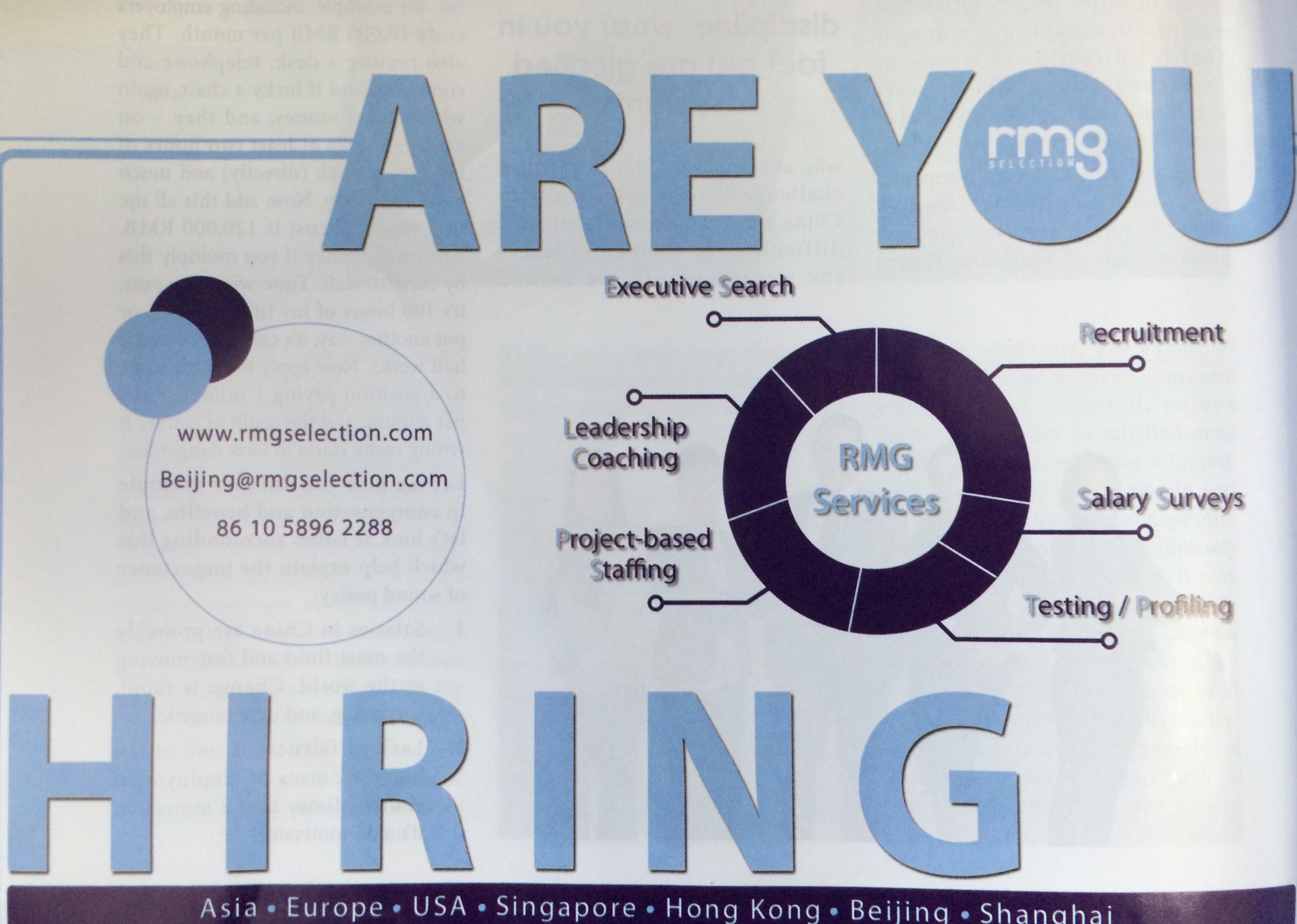Making the Best of Interviews
By Robert Parkinson
 In a recent radio show, China International Radio’s Career Builders, I was asked to talk about the volume of Chinese job changing around the Spring Festival time and spoke mainly from the point of view of Chinese employees. It was a very interesting discussion. Unlike the situation in China, British employers barely worry about the “festive employee loss” issue. On my way back I thought about the topic from the different angle. HR Managers either recruit to fill a new role or to replace someone who is about to leave. In the busy hiring season I notice that the majority of HR managers are often so eager to interview candidates that they misjudge a lot of job applicants’ performance in the interview process. To make the best of interviews, efforts shouldn’t just come from interviewee. I think that it is a good idea to give some potentially-can-succeed candidates a second interview opportunity.
The first principle is to make sure that HR staffs always notify candidates about the interview process and tell them the result on time. Failure to succeed at an interview is sometimes the result of sudden changes in the financial or personnel dynamics of the company. It has nothing to do with the quality of candidates. If you keep a senior managerial type candidate waiting for 3 months without any feedback, they will absolutely be angry with you. Remember the golden rule is to notify candidates as soon as possible after the interview. Instead of sending an email, I would suggest that candidates are notified by phone calls.
Few HR people call candidates about the result of an interview, but it is a very important and indispensable step. Although nobody likes being rejected for whatever reasons, keeping candidates waiting makes it worse. In particular, promising candidates who are interested in your company might postpone or give up interview opportunities from other companies. If you forget or intentionally postpone letting them know, you will leave a poor impression of the professionalism of the HR department and the company. To follow up with the example of keeping a senior manager waiting for interview results, anger equals to distrust. Once they are angry with your ignorance, they rarely turn back to you even if you ask in a very nice way.
I suppose that is also the major reason why there are sometimes complaints from recruitment consultants that HR Managers are sharp and brusque. It seems that some HR Managers and HR staffs behave in a less than professional way, making U-turns on candidates before and after the interview. While a 180°attitude change is likely to alienate, a friendly approach will produce a better result in the long term.
If the interviewee fails to bring out his or her best performance, HR staff should not be judgmental. It is the best to finish the interview by telling a candidate how long he or she will have to wait for the result. Some interviewees might be too nervous or unprepared for the first interview, but sometimes they can show real potential with a precious second chance. The benefit for HR Managers is huge, too. If important positions suddenly become available â and this happens all the time â it is often effective to look back at old contacts instead of searching for new people.
In a recent radio show, China International Radio’s Career Builders, I was asked to talk about the volume of Chinese job changing around the Spring Festival time and spoke mainly from the point of view of Chinese employees. It was a very interesting discussion. Unlike the situation in China, British employers barely worry about the “festive employee loss” issue. On my way back I thought about the topic from the different angle. HR Managers either recruit to fill a new role or to replace someone who is about to leave. In the busy hiring season I notice that the majority of HR managers are often so eager to interview candidates that they misjudge a lot of job applicants’ performance in the interview process. To make the best of interviews, efforts shouldn’t just come from interviewee. I think that it is a good idea to give some potentially-can-succeed candidates a second interview opportunity.
The first principle is to make sure that HR staffs always notify candidates about the interview process and tell them the result on time. Failure to succeed at an interview is sometimes the result of sudden changes in the financial or personnel dynamics of the company. It has nothing to do with the quality of candidates. If you keep a senior managerial type candidate waiting for 3 months without any feedback, they will absolutely be angry with you. Remember the golden rule is to notify candidates as soon as possible after the interview. Instead of sending an email, I would suggest that candidates are notified by phone calls.
Few HR people call candidates about the result of an interview, but it is a very important and indispensable step. Although nobody likes being rejected for whatever reasons, keeping candidates waiting makes it worse. In particular, promising candidates who are interested in your company might postpone or give up interview opportunities from other companies. If you forget or intentionally postpone letting them know, you will leave a poor impression of the professionalism of the HR department and the company. To follow up with the example of keeping a senior manager waiting for interview results, anger equals to distrust. Once they are angry with your ignorance, they rarely turn back to you even if you ask in a very nice way.
I suppose that is also the major reason why there are sometimes complaints from recruitment consultants that HR Managers are sharp and brusque. It seems that some HR Managers and HR staffs behave in a less than professional way, making U-turns on candidates before and after the interview. While a 180°attitude change is likely to alienate, a friendly approach will produce a better result in the long term.
If the interviewee fails to bring out his or her best performance, HR staff should not be judgmental. It is the best to finish the interview by telling a candidate how long he or she will have to wait for the result. Some interviewees might be too nervous or unprepared for the first interview, but sometimes they can show real potential with a precious second chance. The benefit for HR Managers is huge, too. If important positions suddenly become available â and this happens all the time â it is often effective to look back at old contacts instead of searching for new people.
 In addition, I strongly suggest that HR managers should keep a record of all candidates who are failed or postponed at the first round interview. This can be done on a simple Excel sheet or in a more sophisticated company talent database. Those who impressed at interview but just failed to meet the standard needed to move to the next round might usefully be highlighted. Such a database can be the basis of a company recruiting network which is very useful when there is an unexpected and urgent need to fill a position. This will be particularly helpful for start-up or small businesses to further develop and expand. You can also use this to notify those in the ‘not quite’ category of the latest job opportunity. If they are truly interested in the business, they will want to apply again.
For example, recruitment consultants in my company always keep records of past interviews. The official term in the recruitment business for this is called building up the “interview pipeline.” They add information about potential candidates and put them into various categories according to their needs and abilities. Whenever they communicate with these candidates, they always write down key points and useful information in the conversation. Candidates are highlighted in different colors to indicate their potential and attractiveness to clients. In this way, consultants are reminded on the frequency to keep in contact with these applicants. When a level of trust has been built up gradually, these candidates are extremely helpful in sharing not only industrial information but their availability to clients.
With such a powerful candidate pipeline, you will want to maximize what you can achieve with it. In addition to sending them new vacancy updates, what else can you do? There is an important term in the field of marketing – User Stickiness. Many marketing executives work hard to encourage users to keep visiting their official websites, Facebook, Ebay, and store websites. The third suggestion is to apply user stickiness human resource management, too. HR Managers are able to increase the “stickiness” of the relationship with potential candidates simply by adding those high potential candidates to the company newsletter list. In this way, candidates can be updated in the newsletter with industry insights, company news, notices of new product releases, industry surveys, networking events and so forth.
To make the plan work well, you’d better discuss your thoughts with the marketing or sales department beforehand. Make sure that they are willing to open a separate list in the newsletter system. With some advanced newsletter apps, you can track the performance of each list, too. For instance, with my company, the marketing team uses Mail-chimp to send the monthly newsletter out. We can set separate sending lists and name the categories by ourselves. We can see the number of people who open the email, how many times they open it, the specific percentage of people who click links, and who they are after sending newsletters. The app will even usefully rate each person on the list from 1 (poor engagement) to 5 (great stickiness). It is worthy of trying this with solid data feedback, because you can know candidates better.
We are all busy at work. Starting every task from fresh might waste too much time. However, if we can keep discovering new people and make full use of the current candidate pipeline at the same time, what a result it will be! Recruiting is a job with constant daily communication with different people. Wearing the “HR Poker Face” mask every morning and taking it off after dusk will not work at all. To quote a principle from How to Win Friends and Influence People, you have to “become genuinely interested in other people.” I am genuinely interested in candidates. I do believe that hard-working candidates are worthy of a second chance. I urge you to give it a try.
In addition, I strongly suggest that HR managers should keep a record of all candidates who are failed or postponed at the first round interview. This can be done on a simple Excel sheet or in a more sophisticated company talent database. Those who impressed at interview but just failed to meet the standard needed to move to the next round might usefully be highlighted. Such a database can be the basis of a company recruiting network which is very useful when there is an unexpected and urgent need to fill a position. This will be particularly helpful for start-up or small businesses to further develop and expand. You can also use this to notify those in the ‘not quite’ category of the latest job opportunity. If they are truly interested in the business, they will want to apply again.
For example, recruitment consultants in my company always keep records of past interviews. The official term in the recruitment business for this is called building up the “interview pipeline.” They add information about potential candidates and put them into various categories according to their needs and abilities. Whenever they communicate with these candidates, they always write down key points and useful information in the conversation. Candidates are highlighted in different colors to indicate their potential and attractiveness to clients. In this way, consultants are reminded on the frequency to keep in contact with these applicants. When a level of trust has been built up gradually, these candidates are extremely helpful in sharing not only industrial information but their availability to clients.
With such a powerful candidate pipeline, you will want to maximize what you can achieve with it. In addition to sending them new vacancy updates, what else can you do? There is an important term in the field of marketing – User Stickiness. Many marketing executives work hard to encourage users to keep visiting their official websites, Facebook, Ebay, and store websites. The third suggestion is to apply user stickiness human resource management, too. HR Managers are able to increase the “stickiness” of the relationship with potential candidates simply by adding those high potential candidates to the company newsletter list. In this way, candidates can be updated in the newsletter with industry insights, company news, notices of new product releases, industry surveys, networking events and so forth.
To make the plan work well, you’d better discuss your thoughts with the marketing or sales department beforehand. Make sure that they are willing to open a separate list in the newsletter system. With some advanced newsletter apps, you can track the performance of each list, too. For instance, with my company, the marketing team uses Mail-chimp to send the monthly newsletter out. We can set separate sending lists and name the categories by ourselves. We can see the number of people who open the email, how many times they open it, the specific percentage of people who click links, and who they are after sending newsletters. The app will even usefully rate each person on the list from 1 (poor engagement) to 5 (great stickiness). It is worthy of trying this with solid data feedback, because you can know candidates better.
We are all busy at work. Starting every task from fresh might waste too much time. However, if we can keep discovering new people and make full use of the current candidate pipeline at the same time, what a result it will be! Recruiting is a job with constant daily communication with different people. Wearing the “HR Poker Face” mask every morning and taking it off after dusk will not work at all. To quote a principle from How to Win Friends and Influence People, you have to “become genuinely interested in other people.” I am genuinely interested in candidates. I do believe that hard-working candidates are worthy of a second chance. I urge you to give it a try.
 Read the original article, please click: http://t.cn/RcEBvIK
Read the original article, please click: http://t.cn/RcEBvIK










 Freight rates remain low due to a continuing shipping overcapacity and record low commodity prices. Meanwhile, shipping alliances strengthen their market power by increasing their direct sales activities: selling to cargo-owners directly without the mediation of a forwarding agency. These tough circumstances have motivated many traditional forwarders to invest in new sectors such as ecommerce and warehousing. This, in turn, quickly leads to overcapacity in these other sectors too.
While the forwarding industry is somehow blindsighted by the smoke it creates internally, the biggest threat for the $350 billion industry might actually come from the outside. Amazon, the world’s largest retailer and a frontrunner in IT, already provides warehousing services. The retailer also owns drones. At the end of 2015, Amazon started negotiations with Boeing to lease jets in order to start its own air-cargo services. Early 2016 Amazon China has been registered as an ocean freight forwarder, enabling the retail-giant to directly ship from China, still the world’s largest exporter of manufactured goods. In April 2016, rumours were spread that Amazon will invest in buying its very own container ships. This, it is said, is the company’s final step in its strategy to become the world’s first retail oligopoly. Amazon will significantly benefit from its economy of scale. The company’s state of the art technology, including drones, is likely to lead to a much more streamlined and cost saving logistics process.
Alibaba, Amazon’s main competitor, is bound to go a similar way. Alibaba Logistics has already established an advanced hierarchical network within China, using a number of closely controlled partners. In line with its international ambitions, the Chinese retailer is increasingly investing in the development of a global supply chain. For instance, last year the company invested an additional $138 million in SingPost, increasing its stake in Singapore’s national postal and logistics company to 14.51 percent.
It might take another decade, but Amazon’s “own-all” and Alibaba’s “control-all” global supply chain strategies will inevitably transform the logistics industry as we know it today. Besides a fast increase of competition, the two companies will bring in valuable knowledge of information technology, something that will have a significant impact on the traditionally “people-driven” industry.
In the long-term, the recent flow of M&As in the forwarding industry might turn out to be a first attempt to weapon against the tech-savvy newcomers by combining years of logistics experience and knowledge.
Ever since the Chinese kings and Roman emperors moved their armies around the globe, logistics has been a pure people-business. So far the sector has been relatively resistant towards the introduction of information technology. But E-retail is likely to enter the freight forwarding industry on a big scale in the foreseeable future, the consequences for the sector’s traditional labour market should not be underestimated. For instance, imagine a drone delivering cargo directly from the ship to the buyer, without the need for offloading and domestic trucking.
While the current discussion centers primarily on diminishing profit rates and rising labor costs, the logistics service sector might actually have a bigger fish to catch.
The author is a partner and leader of RMG Selection’s Logistics and Supply-Chain group in greater China which provides recruitment and human resource services to the freight forwarding and logistics industries as well as recruiting in-house supply chain roles.
To read the original artical, please click:
Freight rates remain low due to a continuing shipping overcapacity and record low commodity prices. Meanwhile, shipping alliances strengthen their market power by increasing their direct sales activities: selling to cargo-owners directly without the mediation of a forwarding agency. These tough circumstances have motivated many traditional forwarders to invest in new sectors such as ecommerce and warehousing. This, in turn, quickly leads to overcapacity in these other sectors too.
While the forwarding industry is somehow blindsighted by the smoke it creates internally, the biggest threat for the $350 billion industry might actually come from the outside. Amazon, the world’s largest retailer and a frontrunner in IT, already provides warehousing services. The retailer also owns drones. At the end of 2015, Amazon started negotiations with Boeing to lease jets in order to start its own air-cargo services. Early 2016 Amazon China has been registered as an ocean freight forwarder, enabling the retail-giant to directly ship from China, still the world’s largest exporter of manufactured goods. In April 2016, rumours were spread that Amazon will invest in buying its very own container ships. This, it is said, is the company’s final step in its strategy to become the world’s first retail oligopoly. Amazon will significantly benefit from its economy of scale. The company’s state of the art technology, including drones, is likely to lead to a much more streamlined and cost saving logistics process.
Alibaba, Amazon’s main competitor, is bound to go a similar way. Alibaba Logistics has already established an advanced hierarchical network within China, using a number of closely controlled partners. In line with its international ambitions, the Chinese retailer is increasingly investing in the development of a global supply chain. For instance, last year the company invested an additional $138 million in SingPost, increasing its stake in Singapore’s national postal and logistics company to 14.51 percent.
It might take another decade, but Amazon’s “own-all” and Alibaba’s “control-all” global supply chain strategies will inevitably transform the logistics industry as we know it today. Besides a fast increase of competition, the two companies will bring in valuable knowledge of information technology, something that will have a significant impact on the traditionally “people-driven” industry.
In the long-term, the recent flow of M&As in the forwarding industry might turn out to be a first attempt to weapon against the tech-savvy newcomers by combining years of logistics experience and knowledge.
Ever since the Chinese kings and Roman emperors moved their armies around the globe, logistics has been a pure people-business. So far the sector has been relatively resistant towards the introduction of information technology. But E-retail is likely to enter the freight forwarding industry on a big scale in the foreseeable future, the consequences for the sector’s traditional labour market should not be underestimated. For instance, imagine a drone delivering cargo directly from the ship to the buyer, without the need for offloading and domestic trucking.
While the current discussion centers primarily on diminishing profit rates and rising labor costs, the logistics service sector might actually have a bigger fish to catch.
The author is a partner and leader of RMG Selection’s Logistics and Supply-Chain group in greater China which provides recruitment and human resource services to the freight forwarding and logistics industries as well as recruiting in-house supply chain roles.
To read the original artical, please click: Talking of the role of business consultant or strategist, especially in China, this role is completely at odds with the way the HR profession operates. The role of the strategic HR professional ( rather than administration) is, put simply, to help the business with their people “issues”. This means that you need to be an adept communicator, a politician, a manager of big egos (often), in your task of guiding and teaching the organisation that better training, managing, communicating with, recruiting, inducting and treating their team members will result in better results. Often this means encouraging a manager that his direction is wrong or needs improvement. This requires dominance and frankly a low level of compliance. This is real HR.
In my experience, foreign companies in China do not understand or value the role of Human Resources professionals. Companies regard the role of administration and HR as a pooled group of assistants of which the cleverest and most bosspleasing get promoted. Most “bosses”, absolutely including the foreign ones, encourage their chosen-one by tempting them with inflated titles and temping salaries, and whether cons ciously or uncons ciously encourage a “yes boss” culture. They do not encourage critique of their ideas, and frankly neither party could handle either the giving or receiving of critique. (I had a very fun session this week with a very bright, “risingstar” of my company where I tried to encourage her to think of three things I needed to improve. We managed one, with the help of my wife, who (correctly) said that I was impatient. The rising-star agreed!)
Talking of the role of business consultant or strategist, especially in China, this role is completely at odds with the way the HR profession operates. The role of the strategic HR professional ( rather than administration) is, put simply, to help the business with their people “issues”. This means that you need to be an adept communicator, a politician, a manager of big egos (often), in your task of guiding and teaching the organisation that better training, managing, communicating with, recruiting, inducting and treating their team members will result in better results. Often this means encouraging a manager that his direction is wrong or needs improvement. This requires dominance and frankly a low level of compliance. This is real HR.
In my experience, foreign companies in China do not understand or value the role of Human Resources professionals. Companies regard the role of administration and HR as a pooled group of assistants of which the cleverest and most bosspleasing get promoted. Most “bosses”, absolutely including the foreign ones, encourage their chosen-one by tempting them with inflated titles and temping salaries, and whether cons ciously or uncons ciously encourage a “yes boss” culture. They do not encourage critique of their ideas, and frankly neither party could handle either the giving or receiving of critique. (I had a very fun session this week with a very bright, “risingstar” of my company where I tried to encourage her to think of three things I needed to improve. We managed one, with the help of my wife, who (correctly) said that I was impatient. The rising-star agreed!)
 This article is published on Business Tianjin Magazine:
This article is published on Business Tianjin Magazine: